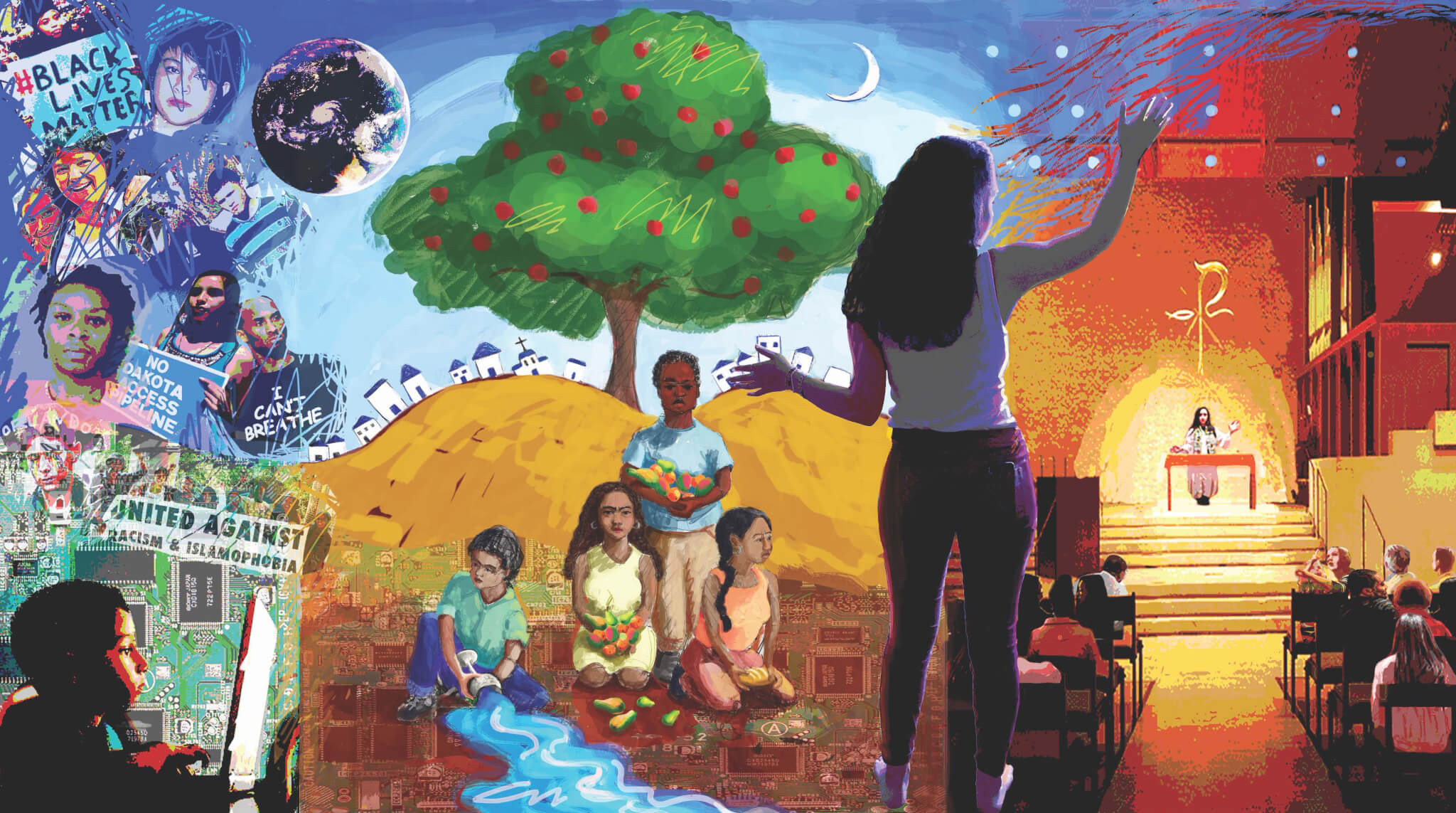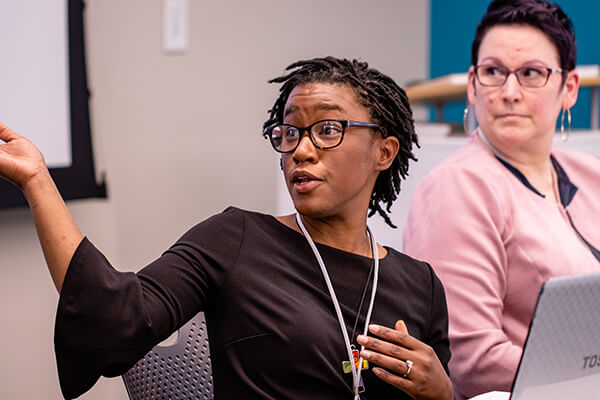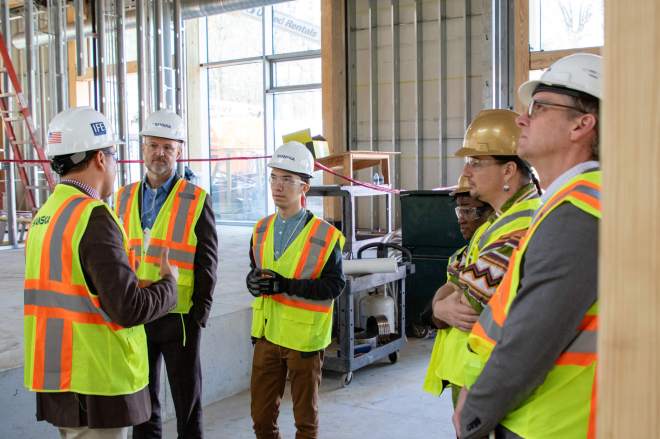
By Sara Logeman
April 5, 2019 | Atlanta, Ga.
Artwork: Lisa Katzenstein
“Creation and the City of God: United Methodist Stewardship of the Built Environment,” hosted by Global Ministries in Atlanta on March 10-11, brought together 32 participants from across the country to explore how communities can build, use and manage their built environments to not only do no harm, but to do good.
“The natural environment is in crisis now and we must demonstrate awareness of the ways in which our stewardship of buildings and property can either contribute to or diminish the health of communities and of creation,” said Roland Fernandes, chief operating officer for Global Ministries and executive director for UMCOR. “Respect for the whole biosphere and respect for the integrity of all creation is a fundamental principle for our time.”
The vision of “the holy city, the new Jerusalem” in the New Testament book of Revelation, a place where all dwell in the healing presence of God, was used as a framing image for the event. From environmentally friendly upkeep of aging church properties to a congregation coming together to protect nearby land from the construction of a pipeline, participants wrestled with how the built environment can encourage the flourishing of all creation.

PHOTO: JENNIFER SILVER
Cross-sector connections discovered, strengthened
From clergy and professors, architects and executives, the consultation welcomed participants from a wide array of disciplines. Each participant also doubled as a panelist, offering insights on topics ranging from the theological significance of the built environment to the power of prophetic witness and advocacy in the public square.
Rev. Dr. David Wilson, conference superintendent of the Oklahoma Indian Missionary Conference, said, “It was amazing to be with so many passionate people from all levels to talk about stewardship of the earth and our resources. I learned so much from the scholars, practitioners and so many others who are involved with the same issue on different levels.”
This interdisciplinary approach gave the conversations a depth and richness, prompting participants to make cross-sector connections that might otherwise go unexamined. It also provided an opportunity to develop common language in relationship, ensuring that the conversation around creation care and the environment – both within and apart from faith communities – embodies more diverse perspectives and gifts.
Envisioning the city of God through buildings and structures
Tours of Global Ministries’ Atlanta Headquarters and the Kendeda Building for Innovative Sustainable Design at Georgia Tech were woven into the schedule. Global Ministries Headquarters is the first LEED Platinum-Certified building built and occupied by a faith institution in the state of Georgia and the Kendeda Building is the first Living Building 3.1 in the Southeast. Leadership in Energy and Environmental Design is a national certification system developed by the U.S. Green Building Council to encourage the construction of energy and resource-efficient buildings. The Living Building Challenge is an international sustainable building certification program created in 2006 by the nonprofit International Living Future Institute. Both tours showcased how newly constructed spaces can be designed and maintained with respect for creation in mind.
“Placing a vision for the City of God at the forefront of building and property management transforms the strategies and values that shape management decisions,” said Fernandes, who helped guide the Global Ministries team in its renovation efforts of the new headquarters.
“If the City of God is a place where God’s light shines brightly, we must ensure that our buildings operate efficiently without generating emissions that darken the sky with pollution,” Fernandes continued. “If the City of God is a place where life-giving waters flow, then we must engage in water, waste and pest management practices that ensure the cleanliness of waters both nearby and downstream.”

PHOTO: ANTHONY TRUEHEART
Envisioning the city of God through people and place
Conversations flowed beyond the building and management of eco-friendly spaces to address the people that inhabit such spaces.
If and how our spaces create a sense of belonging and inclusion was explored in one panel, particularly in places of worship where factors such as language, sensory needs and physical accessibility can either foster or hinder an experience of God. How do we care for marginalized populations who have historically felt unwelcome and find ways to both honor and incorporate their experiences within our shared spaces?
Participant Allyssa Green, consultant and special education teacher, served on the former United Methodist Committee on Disability and now teaches congregations how to reflect upon and implement more inclusive practices. “As a person of faith and a person with a disability, I believe it is necessary that space is available for us to have solace and support,” she said. A question Green often asks communities to consider is: “Do they see Christ in us, do they see Christ in what we are doing? Or are we just checking off boxes?”
The reality of those living in liminal, ever-changing spaces proved to be another relevant panel topic, especially in the City of Atlanta, the ancestral homeland for the Muscogee Creek people (alternative spelling, “Maskoke”). How do we care for vulnerable populations who are displaced and find ways to both honor and incorporate their experiences within our shared spaces?
Participant Marcus Briggs-Cloud, director of the Ekvn-Yefolecv Indigenous Maskoke Ecovillage, spoke on the displacement of his ancestors 182 years ago and the gradual decline of his native language and rituals. His radical response to vulnerability was to “recreate the society that our language once functioned best in.” In the community, “We can wear our traditional clothes without shame,” Briggs-Cloud said. “We have a language immersion program, so all the children are first language speakers. We have this breath of hope for our language through our Ecovillage.”
Called to care for creation
Dr. Laurel Kearns, professor of Ecology, Society and Religion at Drew Theological School, led the group in a time of reflection to close the consultation. Returning to the vision of the City of God – a place that is seen in fleeting glimpses, but not yet in full – she offered this mobilizing idea: “How things ought to be shape what we are called to do.”
With compassion and in careful intention, the stewarding of creation is a task that God calls us to in mission. Global Ministries’ Theology of Mission statement reminds us that “God’s light shines in every corner of the earth, and God’s mission extends to all creation. There are no places where God’s grace has not always been present, only places where God in Christ is not recognized, served, or heeded.”
As United Methodists, how are we being attentive to the groans of creation and choosing to live in ways that invite the heavenly vision of the City of God to dwell among us on earth?
Sara Logeman is the content strategist for Global Ministries.

